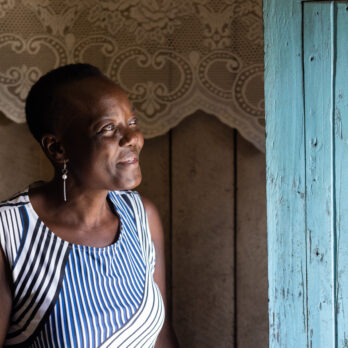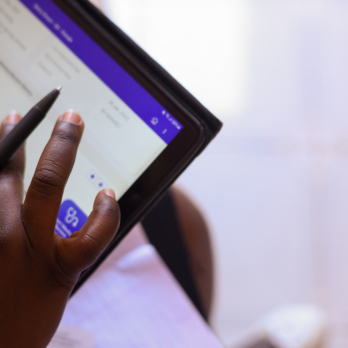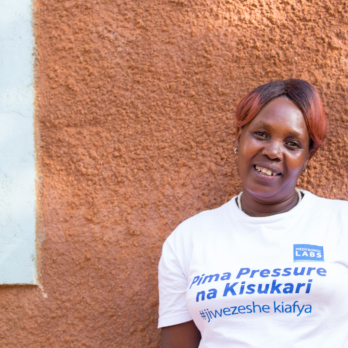“Do not go where the path may lead, go instead where there is no path and leave a trail.”
– Ralph Waldo Emerson
Anyone can follow a path. Still, it takes a unique and inspirational leader to identify novel opportunities for a different, more innovative route.
And these new and innovative opportunities are the core of Medtronic LABS’s mission to expand access to healthcare for patients, families, and communities worldwide.
We recently had the opportunity to speak with Megha Kumar, Medtronic LABS’s Head of Global Partnerships. Ms. Kumar shared with us the professional journey that brought her to LABS, her approach to engaging and connecting key stakeholders to our vision and each other, and some exciting initiatives in the works.
Read the full Q&A below.
Cross-sector collaboration is what Medtronic LABS is all about. Your role, then, must be quite dynamic and essential to meeting the organization’s goals. Can you tell us a bit about what your role involves?
You’re right, my role is very dynamic!
It spans many corners and areas of collaboration for us, but there are four main areas of focus for me.
First, there are Country teams, which are all about building government relationships “in-country.” I have to ensure we align with where local governments are heading and that we’re supporting rather than distracting from those goals. The work we’re doing must be both recognizable and adequately positioned to be effective.
Next, there are our Innovator partnerships. These are partnerships with organizations working in the same countries and realms as LABS. In some cases, they are partnership-based relationships where we collaboratively figure out how to bring our strengths and goals to the table. Depending on the circumstance, we might integrate our work to deploy on the ground or establish a knowledge-sharing-based partnership.
Third, are our Global advocacy networks. These networks consist of multi-lateral organizations like the World Health Organization (WHO), NCD Alliance, Community Health Impact Coalition (CHIC) and other convening bodies that have a significant global influence. It’s important for LABS’s mission that I stay plugged into what’s happening in these international forums and understand what people sitting in these global seats prioritize so that we can mobilize our work accordingly.
The fourth pillar is our Funder relationships. In our role at LABS, we’re intermediaries that help funders bring our work to the countries and communities that need it most. Funders frequently support country-level health delivery, so in my role, I regularly meet with them to understand their priorities. Staying connected to our funders also allows me to continuously get essential feedback from them so we can refine and improve our pitches, programs, and services.
And how do those four pillars or buckets work together?
That’s an excellent question. Mainly the pillars interact at the country level.
For example, I’m heading to Ghana in two weeks and will meet with key people from each of those four pillars. It’s an exciting opportunity to think about how we can integrate our programs more collaboratively with other players. We’ll also meet with an influential international funder, government stakeholders, and local offices for WHO and other agencies.
Ultimately, we work with the stakeholders in the four buckets toward the same goal: to support positive patient outcomes and move the needle on the ground. We’re usually working towards that common goal, and our efforts all really come together at the country level.
What inspired you to join Medtronic LABS? What was your career path before your current role?
One of my favorite things about working at LABS is that no two people here are alike. I come from a traditional MedTech and pharma background. My education has been in both public health (MPH) and business (MBA).
After working in MedTech for a while, I spent time at a few emerging market startups. For example, I supported one of my business school classmates in founding a breast pump company in Kenya, which inspired me to explore medical and digital innovations and the impact these innovations could have in the global health sphere. These experiences catalyzed my leap into global health.
My understanding of the public health system and business acumen allowed me to understand how to bring these services to countries in a financially viable and sustainable way from a policy perspective.
Also, this early exposure to the worlds of both global health and technology allowed me to develop a keen eye for where different sectors overlap and, therefore, where the greatest opportunities for collaboration and innovation lie.
What are some of LABS’s upcoming initiatives that you are most excited about?
We partnered with the Africa CDC (a new entity developed over the last few years) to host an event at their public health conference in December 2022. Since then, we’ve grown and are formalizing that partnership. And what I mean by that is we’re formalizing what we can do with a large public health organization. We’re bringing together LABS’s private sector role, and putting pen to paper on what cross-sector collaboration can look like. It’s really exciting.
We see this leading to a large event at the World Health Assembly in May 2023, where private and public sector voices will unite to have this public health conversation on the global stage. In the lead-up, we’re working with the Africa CDC to spearhead deeper collaboration between private and public organizations on global health. It’s an exciting step in the right direction.
What makes LABS’s approach to building cross-sector partnerships particularly unique or effective?
I think Medtronic and Medtronic LABS have made a really targeted decision to directly support countries in their objectives to strengthen public health care.
Other players might focus on enhancing access to their particular products. For us, it’s all country-led. It’s about what those communities need to strengthen their primary healthcare systems.
We’ve used private sector capital to invest in innovation instead of driving specific products. Our work demonstrates that this strategy leads to more sustainable country-driven growth in the long run.
How do you strike a balance between your country-led strategy and the product-led strategy of many of your partners?
It’s a challenge, but there’s an important role for both product and country-led strategies. There’s a real need for those hard products, so it’s just as important that they make it to the same countries and communities we serve and that they remain accessible. Our role is just a bit different. We see our thesis as an investment choice – we’re investing in innovation and overhead to multiply the investment power of other funders so that every dollar they provide goes directly toward program operations and impact. As a unique private sector innovator, we have the flexibility to do this.
At the end of the day, it’s about understanding our role as a private-sector NGO vs. the traditional private-sector player. We chose our strategy to serve a need on the innovation side of things.
What are some of the most rewarding parts of your work at Medtronic LABS? Were there any standout engagements for you from the last year?
For me, it’s definitely the in-person and on-the-ground time. It was so inspirational this past year to see so many stakeholders come together and share in this joint vision for what health systems and patients need and what needs to be done.
Through showcasing our work at larger conferences and speaker settings, we’ve been able to highlight the measurable impact we’re making and hear the positive reception from our partners and innovators. That’s the real spark and inspiration. And how about the challenges?
These opportunities to speak on the global stage have allowed us to build more partnerships and expand our reach and network.
I have to say that a real 2022 highlight for me was in April when we attended the Ghanaian government’s strategic dialogue on NCDs. We had the chance to present our vision and propose a new cross-sector partnership. Our proposal caught the ear of a lot of Ministry of Health members.
The result was that a door opened for us to better understand what the Ghanaian government needs from a health partnership perspective. My hope is that the trip I’m going on next month will lead to a long-lasting relationship that will serve vulnerable communities in Ghana for years to come.
And how about the challenges?
Things change so rapidly, and we always adapt. That can mean our priorities are shifting to meet evolving demands in the countries we’re working with. Health priorities are shifting between COVID and the volatile state of global affairs. That’s just the reality of the economic and social situations in the geographic regions we reach.
We must practice patience and develop a deep understanding of the communities we engage to innovate and deliver systems-level programs that truly meet their needs.
Thanks so much, Megha. That was a really insightful and interesting conversation! Do you have anything else you’d like to say?
Of course, I appreciate the opportunity to reflect on my own work as well!
Yes, I’d like to add that no two days are ever the same here at LABS—and that is the fun and the challenge of it! Because my role spans those four major buckets that aren’t always interconnected, I’m connecting the dots a lot.
I’m constantly asking myself, “where are the opportunities? How do these conversations overlap?” We’re here to enable building those connections between the partners we’re working with. And that’s my favorite thing–when I successfully connect partners to create a lasting change in the communities and countries we serve.
Measurable outcomes achieved through collaboration
We hope you enjoyed this Q&A session with Medtronic LABS Head of Global Partnerships, Megha Jumar. If you enjoyed reading this conversation, please share it with your network. You can read our previous team member Q&As on our blog, along with other exciting insights and stories. Stay tuned for more team profiles in the coming weeks and months.
To get in touch with us, please visit our contact page. Together, we can transform global healthcare systems and deliver essential care to those in need.


